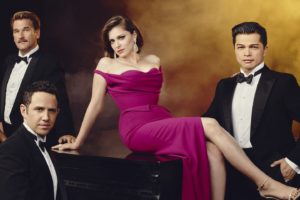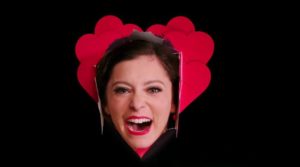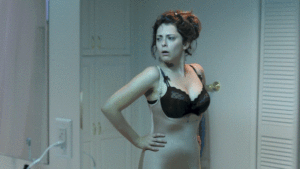At the beginning of its second season, The CW’s Crazy Ex-Girlfriend had an uncertain future. Although it won two Emmys for its choreography and editing, as well as a Golden Globe for Rachel Bloom’s performance as main character Rebecca Bunch, the show’s ratings left a lot to be desired by the first season finale. The CW delayed its renewal, presumably waiting for Netflix viewership data. Recently, it was reported as the most popular show on the streaming service in four US states and approved for third season along with 6 of The CW’s other series.
The American cultural attitude toward “quality = extension” is a complex topic within itself, considering other nations regularly have influential television programs that last a single season. However, the first season of Crazy Ex-Girlfriend deserves recognition as a technical marvel in writing, acting, and musical talent. It holds up entirely on its own without need for continuation.

The show opens with a teenage Rebecca Bunch enthusiastically telling her uninterested summer camp boyfriend, Josh Chan (Vincent Rodriguez III), about her special love for theater. Josh dumps her in that same scene and many years later, they reunite on a busy NYC street while now-top lawyer Rebecca is in the midst of a nervous breakdown. Conflating that old feeling of love for theater with falling deeply in love with Josh, Rebecca quits her law firm and moves to Josh’s hometown, West Covina, California.
Even practiced writers often forget the importance of setting, but in this case, it’s extremely clear that West Covina basically is Josh. “Only two hours from the beach,” containing seemingly only one club, and the required boba tea shop, it seems quite mediocre if you’re not Rebecca. Like West Covina itself, Josh might seem nice on the surface, but he also expresses several qualities throughout the season that may make a rational person think twice about pursuing him (such as, say, willingness to emotionally cheat on the girlfriend he’s dated since high school). On the other and kinder hand, West Covina also has charms that a person who isn’t Rebecca may overlook. For instance, it has a loveable cast of residents, such as Rebecca’s new BFF Paula Proctor (Donna Lynne Champlin), new boss Darryl Whitefeather (Pete Gardner), and her second love interest Greg Serrano (Santino Fontana).
Bloom’s performance as Rebecca never misses a step, and she, along with the show’s consistently hysterical writing, gets her hooks into the audience about as much as the show’s songs’ actual hooks. The show’s plot attributes her irrationality and total lack of shame to her nervous breakdown, but audience members who have experienced unrequited love recognize what she actually is. She’s a fictional and humorously-edged manifestation of the extreme and invasive lengths one dreams of going in order to get an uninterested person to love them back.
Thus, this is the simple goal of Crazy Ex-Girlfriend’s first season: Rebecca Bunch gets with Josh Chan, despite all the odds working against her. This happens via the circular storytelling of that same season: woman sees man, and falls in love irrationally. Woman does irrational things in order to get man, and woman gets with man and reveals to her love that she did incredibly irrational things. Whatever happens later is not necessary, because the point isn’t how Josh reacts and how things go from there. The point is that the audience feels energized from empathizing with Rebecca and then reaches catharsis along with her at the season’s end.

And then there’s the show’s second season. In season two, the show does not have the same simple drive as it did in the first season, making the show itself less simple. Presumably, the drive is now for Rebecca to finally see that she is a person worthy of love outside of her relationship with Josh and take serious steps to treat her mental illness. Undeniably, season two has made great strides toward that; Rebecca now has a close group of gal pals in addition to Paula, Greg prevented a near continuation of their toxic relationship by leaving West Covina, and however unwillingly, she has a more serious commitment to her employer.
In its own way, season two is a strong season. It has developed several characters–including Josh and his ex, Valencia (Gabrielle Ruiz)–out of their original two-dimensional, trope-like characterizations into actual human beings. It shifted its gaze out of the highs and lows of obsession with someone out of one’s reach and has looked closer at friendship dynamics between women. It has retained season one’s ability to serve up amazing tunes (it’s extremely unlikely that any future episode will have a song that tops episode three’s showstopper “It Was A Shitshow”). That being said, the show’s angle of empathy has changed.
Here’s the thing: you could relate to Rebecca in the first season if you’ve ever been in unrequited love because it feels the same for nearly everyone. The delusions that they love you back and will call you at any minute, the literal inability to stop thinking about them at any moment of your day, the attempts to guess what they like in a person in order to reformat yourself to an ideal that isn’t even yours. It’s a special type of hell that requires all of your self-control to not act in a way that’s crazy.
As of season two, you may like Rebecca, but you are no longer Rebecca. Her relationship with Josh falls apart immediately in the beginning of the season, with the audience left to watch her struggling to create the perfect relationship she dreamed of while he’s checked out. Now that he’s more than the charming, sweet object of desire, it’s very clear that Josh has his own set of problems. He doesn’t know how to live without being in a relationship and doesn’t have anything else going on in his life to fill the gap. He’ll even take back a woman who created a pregnancy scare and urinated on his possessions. As for Rebecca, now that she has healthily established priorities outside of him, you no longer want for her what you did last season. She still works to force a relationship she doesn’t need and you relate more to the show’s outside narrative structure, which slowly pushes her in a better direction.

Going deeper into Rebecca’s individual issues takes out the universal aspect of the viewer experience. The parental abuse and neglect. The scars leftover from a friendless childhood. The deep absorption into a law career that she never wanted in the first place. Everyone has similar problems, sure, but these problems don’t look the same to everyone like the way falling in love does. On top of that, recovery from mental illness is an extremely individualized journey, so it can’t be summarized into an hour-a-week television show that depends heavily on classic romantic-comedy tropes. There are no classic tropes for mental illness treatment, because our culture has a history of villainizing it instead of understanding it. Season one had an enormous cultural context on which to build its foundation, while season two is involved in a topic that many of us would rather not openly discuss.
In addition, season two’s acts are less defined than season one’s. Season one had a constantly increasing tension from Point A, “Rebecca falling in love with Josh,” to Point B, “Josh falling for Rebecca.” Meanwhile, season two’s Point A is “Josh and Rebecca don’t work out and Rebecca is crazy,” while its Point B is “Josh and Rebecca don’t work out again and Rebecca is even crazier.” The soundtrack of the show reflects this change as well. Gone is a track like “West Covina” and its two reprises, which marked turning points in season one. Season two’s soundtrack more often refers back to season one rather than echoing its own arc, peaking at season finale’s “Rebecca’s Reprise,” which is essentially a medley of several subverted season one tracks.
By advancing from high-quality season with all themes written tightly together and a probable perfect ending, season two was disadvantaged from the start. This isn’t to say that Crazy Ex-Girlfriend has lost its place as a quality show; even with its looser structure, it retains much of the first season’s technical aptitude. Vella Lovell’s short dance solo in “We’ll Never Have Problems Again” on its own should score the show another Emmy for Outstanding Choreography and Champlin deserves a few nominations for taking Donna’s character to new heights.
In branching out from its universal drive and storytelling structure, Crazy Ex-Girlfriend took the risk to become a somewhat different show. However, it’s as funny as ever and this new direction gives it a chance to present to viewers what we don’t see enough of on television: an understanding and compassionate look into the struggles of mental illness, female friendship without all the cliche toxicity, and an empathetic and human look into everyone.

